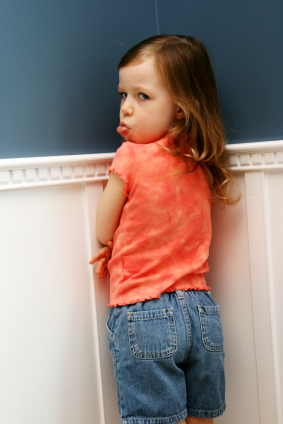You can learn many things from children. How much patience you have, for instance.
~Franklin P. Jones
A while back, I was at the zoo with my family, walking behind this chubby little kid and his mother. The kid suddenly turns around and yells, “C’mon, Mom, move your fat ass!” I stopped for a second, expecting this kid’s mother to pick him up and pile-drive him into the ground. Instead, she softly said, “You don’t talk to me like that.” I so badly wanted to grab this kid by the arm and yell at him.
We’ve all been in this situation, whether it’s a stranger’s, friend’s, co-worker’s, or an acquaintance’s kid. At some point you’ve witnessed a serious brat-attack and wanted to intervene, but the little voice inside of you, for some reason, held you back. I remember sitting in church behind two little girls and an older woman who looked to be their mother. She was staring straight ahead and being engaged in Mass. But the two girls were squirming in the pews, chuckling, hitting each other and making all sorts of noise. For most of the hour, I couldn’t concentrate because I was so agitated by their antics. I finally shot them a dirty look and asked them to be quiet, which they did, for five minutes. I don’t think the woman said a word to either one of them.
Google “Disciplining other people’s children” and you’ll come up with a wide range of views, from “I would absolutely discipline the kid because it takes a village to raise a child.” to “This is my kid and don’t you dare even think about disciplining him/her. If you do, then we’re going to have a problem.”
So what’s the right answer? It depends.
Is there a safety issue involved? I think this is the exception to the rule of “no intervention.” So if we’re at the park and little Johnny is about to jump off of the six-foot play structure and onto your kid (a la WWE-style), then you should definitely open your mouth. Same if you’ve invited your boss and his kids to your house for a BBQ and his little girl gets a hold of your lighter fluid and some matches.
What’s the situation? If safety’s not an issue, then where you’re at may influence your decision to discipline someone else’s kid. If it’s your house, then for sure – your house, your rules. If you’re at the mall and some kid is tearing pages out of a magazine, yes, you might say something. How about at an acquaintance’s house, amusement park or the airport? Use your best judgment and look at the circumstances and what’s going on around you. More than likely, it’s better just to walk away.
Is there a teaching lesson here? Be very careful. This kind of goes back to the heart of this dilemma. What you would consider a teaching lesson might be considered overblown or stupid by someone else. Maybe it’s OK for some parents to have their kid cuss or run around with a sharp object. I have good friends who are teachers and to whom discipline comes second nature. You know, bend at the waist or get on one knee, look the kid in the eye and gently say, “That’s a bad word and it’s not safe to run around with a butter knife.” Again, use your best judgment. Some parents might take exception to you teaching their child.
So if you do decide to make a kid cry, oops, I mean, teach a child a good life lesson, remember a few things:
Involve the parent: This is the adult thing to do. But if you really think about it, and not to generalize, is it a stretch to say that the kid is taking on the mannerisms of the adult? Never mind, that topic will be for another blog. Anyway, the adult thing to do would be to use the same gentle teacher voice, catch their attention from playing Bejeweled, and say, “Excuse me, but is that your child throwing rocks into the Koi fish pond?” This kind of approach should usually be a strong enough hint for the parent to take some action.
Watch your tone: Be calm but firm. The most embarrassing thing is to have the kid laugh at you or tell you to (bleep) off. Let them know you’re serious without going into straight tirade beast-mode. In other words, keep your anger in check.
NO physical contact: This is a bad idea all around. (Like I said, unless this involves some sort of immediate danger.)
Explain Yourself: Remember, no matter how bratty or annoying a kid’s behavior is, he/she is still a kid. They might not know any better or are completely oblivious to what they’re doing. If you’re going to speak up, make sure this kid knows what they’re being called out for (“That isn’t safe for you or the kids you’re playing with.”, “That’s very hurtful language.”, “Someone else is going to have to clean that up.”)
When was the last time you disciplined someone else’s child and what for?

